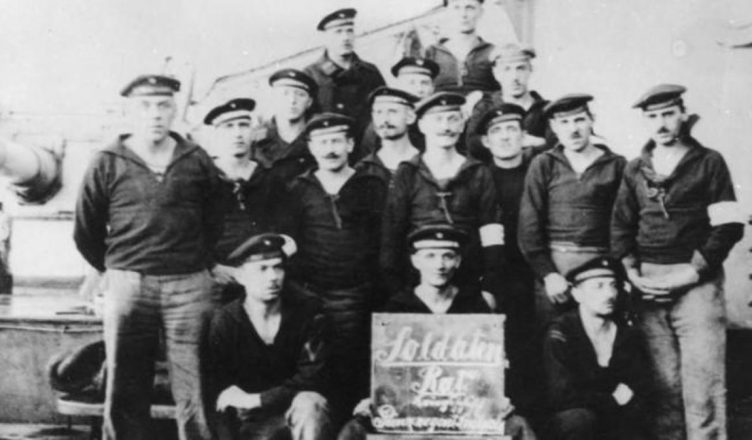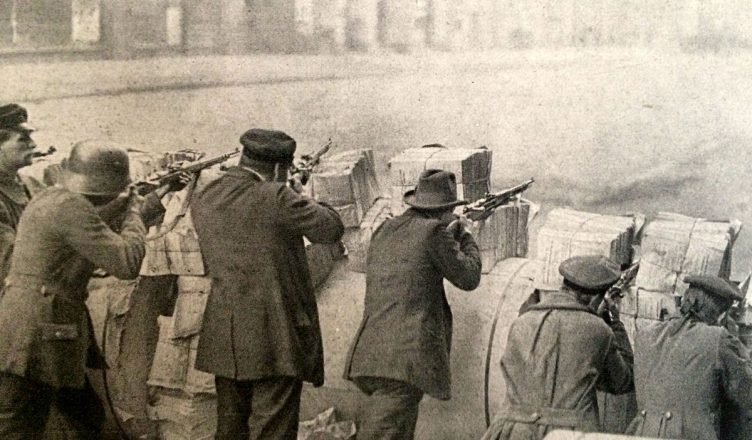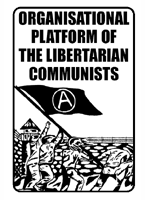 The following are the notes from the talk given at the ACG public meeting in Leicester on 10th November 2018
The following are the notes from the talk given at the ACG public meeting in Leicester on 10th November 2018
In this centenary of the end of the First World War and the media
hyping of Remembrance Day we have stories like “How Lloyd George Ended
the War” along with praise for Marshal Petain, the arch-militarist and
leader of the Vichy regime from French President Macron. We are told the
Allies were fighting for “civilisation” and democracy against Prussian
militarism. Curiously the German Empire from 1871 to 1918 (and the
North German Confederation before it in 1867) had universal male
suffrage whereas universal male suffrage was not introduced in Britain
until 1918 (women in both Britain and Germany had to wait until after
the War for any voting rights). But how did the World War Really end? In
fact, it was the working class that brought about the end of the War
through disorder, riots, mutinies, strikes and indeed two revolutions.
The First World War was a watershed for the workers movement. The
majority of the Social Democratic Parties in Europe, including the
Labour Party, took the side of their particular states, whilst
syndicalist unions like the Confederation General de Travail (CGT) which
had promised a general strike if war broke out, caved in and were swept
away by war fever. A minority of social-democrats like the Bolsheviks
and the Menshevik Internationalists in Russia opposed the war. A
minority within the anarchist movement supported the Allies, with the
majority taking clear anti-war positions.
In fact, the Armistice signed by Marshal Foch with the German military leaders on November 11
th
1918 did not end the War. Fighting continued on many fronts with a
result that 10,000 were killed, wounded or reported missing on that day.
Indeed, the Allies continued to wage war with the new Russia created by
the February and October Revolutions long after the signing of the
Armistice. Britain and France eventually withdrew from Russia in April
1919 because of strikes and mutinies in their own countries.
In Britain and France in there was great support for the War. In
Germany there was a more subdued support for the War, whilst in the
Austro-Hungarian Empire the subject peoples-Slovenes, Czechs, Ruthenes,
Croats, Serbs, Italians etc- were tepid about mobilising. This less than
enthusiastic support for the war became more pronounced as the
Austro-Hungarian Empire quickly suffered several defeats. In Russia
there was discontent from the start and a defeatist attitude towards the
Tsarist autocracy’s direction of the war. This become more pronounced
from 1915 with the start of mutinies within the Russian Army.
In Britain the Labour Party supported the War, in France the
Socialists in general and the unions did the same, with the exception of
Jean Jaures whose anti-war stance led to his murder. In Germany the
Socialists rallied the German working class with the defence of
civilisation against Russian autocracy and barbarism. The German trade
unions banned all strikes, the only exception being the
anarcho-syndicalist FVDG whose anti-war position led to their banning by
the State. Those Socialist MPs- Liebknecht, Ruhle- who had anti-war and
internationalist positions, failed to vote against war credits in the
German Parliament on August 4
th and obeyed Party discipline. Only one socialist deputy abstained and he failed to make any political statement about this act.
The First World War followed the American Civil War in its
industrialised slaughter. Casualties began to mount and in Britain this
led to the introduction of conscription in January 1916, resulting in
draft dodging and conscientious objection. Within the Russian Empire war
weariness, exacerbated by food shortages, grew and in February 1917
women workers and housewives demonstrated on International Women’s Day
with the slogans of Down With The War! And Give Us Bread! They brought
out male workers in the factories and combined with soldiers’ mutinies
this brought about the February Revolution.
The February Revolution in Russia had immense sympathy among the
working class internationally, first of all because it was seen as a way
of ending the War.
In Germany living standards began to fall because of the war and the
allied blockade. Prices rose and inflation soared. Wages fell and by
1915-1916 many foods became scarce, with a veritable famine. However,
the rich were protected from this suffering, and this included the
officer class within the army and navy. This developed a class
consciousness and a polarisation between the ruling class and the mass
of the population. Starting in 1916 workers ignored the Social
Democratic Party and the trade unions and took part in direct action and
strikes to improve their situation.
The following year there were massive strikes throughout Germany. The
worsening food situation was aggravated by a fuel shortage. The Russian
Revolution further added fuel to the fire. In April 1917 there were
huge strikes in Berlin, Leipzig and elsewhere. 200-300,00 went on strike
in Berlin against a decrease in bread rations. In Leipzig the strike
became openly political with demands for peace without annexations, and
freedom for political prisoners.
The strikes were followed by hunger strikes in the Navy against the
decrease in food rations. The officers were thoroughly hated for their
arrogance and the fact that they were better fed. In August mutinies
broke out with sympathy strikes in Wilhelmshaven harbour. The High
Command reacted with repression and two sailors were executed.
Massive demonstrations followed in German cities in November 1917. In
January 1918 in Austria, which faced a similar situation to Germany,
there were massive strikes and demonstrations because the peace talks
with Russia were failing. A massive strike followed in Berlin on January
28
th. The demands of the strike were: workers’
representation in the peace talks, better food, the end of martial law,
and a democratic regime in Germany. The strike spread to many towns and
cities., with over a million on strike in the next few days. The
authorities replied with repression, deploying police and the military.
The strike failed but in July and August wildcat strikes broke out, but
they were soon defeated. Serious defeats increased the number of
desertions. By late October the German High Command attempted a naval
attack on Britain. Sailors at Wilhelmshaven and Kiel were expecting
peace and feared that this expedition would destroy any chance of peace
negotiations and that the officer class were planning a coup d’état.
Mutinies broke out. Sailors took over Kiel forming sailors’ councils
with dock workers also creating workers’ councils. The rebellion spread
to other ports and harbours. This was followed by a spontaneous uprising
throughout Germany. Soldiers refused to fire on the demonstrators.
Workers, soldiers’ and sailors’ councils emerged everywhere. On 9
th
November the Kaiser abdicated and fled to the Netherlands. The monarchy
was ended and the new republic began peace negotiations with the
Allies. The action of the masses had brought about the end of the War.
As we have seen there was also unrest in Austria. Mutinies broke out
in Czech and Ruthene units in June 1916. And these spread in 1917 and
1918. On February 1
st, 1918 a mutiny broke at at Cattaro
(Kotor) in Montenegro with Czech and Italian sailors in the forefront. A
red flag was run up on the cruiser St George. The mutiny was crushed,
with 4 of its leading lights executed. In France where soldiers suffered
great suffering in the trenches mutinies began in May 1917. The 21
st Division revolted and its leaders were shot. Revolts followed in the 120
th Division and then the 128
th.
Twenty thousand deserted. The authorities reacted with a mixture of
repression and compromise, executing 49 whilst promising more leave and
better conditions. At least 918 French soldiers were executed during the
War. Russia had sent two brigades to fight with the French Army in
1916. Mistreatment by the French led to unrest, with an outright mutiny
taking place in May 1917. The French then moved the brigades to La
Courtine, an isolated camp in south central France. Here they held mass
meetings and refused to return to the French front, having already
suffered 4,000 casualties. They elected soldiers’ committees, refused to
recognise their officers and defied the Russian High Command. The
French military, in collusion with the new Kerensky regime in Russia,
surrounded La Courtine and began an artillery bombardment. Hundreds
died.
Within the Bulgarian Army unrest led to 600 executions. In Italy,
which had joined the carnage later than the other combatants, there was
an officer class that was drawn from the upper classes and which looked
on the rank and file with contempt. Soldiers were seen as completely
expendable resulting in huge losses. 750 executions took place with many
hundreds of other summary executions. 25,000 deserted, 5,000 defied the
callup whilst 34,000 others obeyed the call-up but deserted before
mobilisation. There were mutinies in the Army with the Ravenna Brigade
revolting in May 1917 and the Catanzaro units in July 1917. These were
brutally repressed.
Within the British Imperial Army, where there was a similar class
divide between the officers and the ordinary soldiers. Soldiers were
flogged and manacled for trivial offences. New Zealand troops mutinied
at Etaples in September 1917. Later in the month a mutiny resulted in 23
deaths at Boulogne. Strikes broke out in labour battalions on September
11
th, and mutinies continued through to 1918. Resistance to
the war expressed itself in self-inflicted injuries to avoid being sent
to the Front. As a result, 3,894 soldiers were sentenced to prison for
these actions.


















